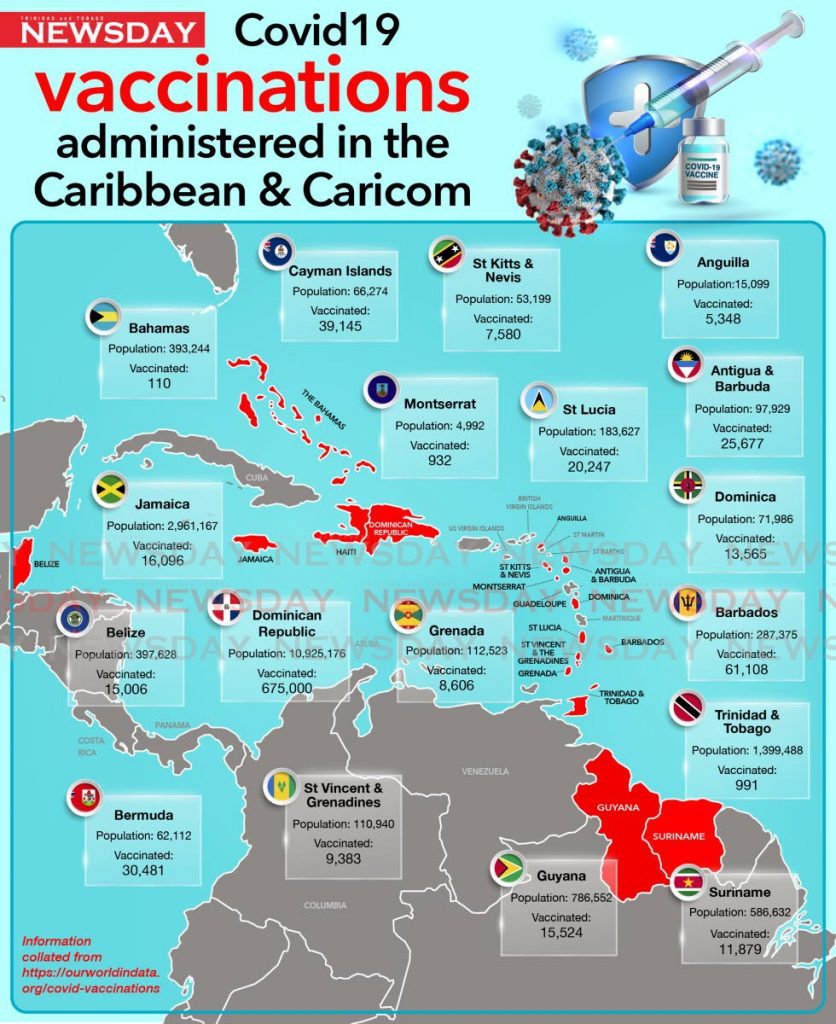Caricom must pay higher prices to obtain covid19 vaccines now

kmmpub@gmail.com
Caricom can secure the 20 million vaccines that we need in a few months by simply following the laws of supply and demand. Vaccines are in short supply, and in great demand.
However, most of the buyers (in this case, national governments) are constrained by political concerns of not being seen to “overpay” or be “taken advantage of” by the private sector.
The result: global shortages and delays. As it is, we are simply offering the vaccine manufacturers too little incentive to put ourselves anywhere near the front of the queue.
Right now, there is a huge divergence in the approaches of different Caribbean countries. In many of them, however, this is underpinned by a visceral distrust of private enterprise. Unfortunately, just because we don’t trust the private sector doesn’t mean that we can pretend the fundamental laws of economics don’t exist.
Writing in the Wall Street Journal, economists Eric Budish and Chris Snyder set it out neatly: “Consider a firm that will vaccinate one billion people at a fixed price of $40 each. The firm earns the same $40 billion whether it supplies the billion courses in a single month or stretched over a year. But doing it in a month requires 12 times the capacity costs. If you are wondering why vaccination is taking so long, this is the basic economic reason.”
Most countries, including some developed nations in the EU, are paying US$3 a dose for Serum Institute of India’s AstraZeneca vaccine (amongst other options available). At this price, 16.65 million two-dose courses of this vaccine – enough to cover 90 per cent of Caricom citizens – would cost US$50 million. To put this in perspective, that is 0.7 per cent of Trinidad and Tobago’s national budget or 0.8 per cent of Jamaica’s.
Now compare this trifling sum to the cost in blood and treasure imposed by the pandemic. Tourism has come to a standstill in most of the Caribbean, with Barbados and the Eastern Caribbean being hit particularly hard. In energy-dependent TT the virus cost US$1.33 billion last year.
The vaccine’s economic benefits are huge. The University of Chicago’s Michael Kremer, who recently spoke at Jamaica’s Catalyst Health Innovation Forum put on by regional health leader Dr David Walcott, has estimated that the economic value of one course of the vaccine is US$5,800.
But we are not paying anywhere near this.
At the same event, I was on a panel with Unicef’s director of health programmes, who, frankly, sounded exasperated at the lack of international co-ordination.
The only way to obtain the vaccines without waiting for months and years is to increase our bid. The price for upper-middle-income countries is US$5.25. We should start by going to the Serum Institute and offering double that, gradually bidding up. Even if we end up paying ten times the price that the EU is paying, it will still be peanuts in comparison to the economic cost of our current situation.
We shouldn’t fear getting into a price war with richer countries. For one, they have already secured much of their supply. For another, the amount we are asking for is relatively small. Third, there is a strong international moral case that the virus is disproportionately affecting our small tourism- and energy-dependent economies. Some diplomacy is required, but we can get the global community’s blessing.
South Africa has already done it: as an upper-middle-income country it must pay US$5.25 for the vaccine, more than the EU. It has already begun receiving shipments.
Funding is not an issue. As a group, Caribbean countries are not poor. The Inter-American Development Bank has already indicated to Caricom leaders that it will make loans available for vaccine procurement at heavily subsidised interest rates. The money is there: we should use it.
Caribbean governments must allocate more funding towards vaccine procurement and joint diplomacy. Indeed, we should even start exploring the idea of building a vaccine manufacturing facility in the region- which could be the start of a nascent industry.
As I’ve argued before, together with former Caribbean Development Bank director of economics Justin Ram: this is not the time for insularity. If our leaders, who have so far done admirably well in containing the virus, can do the maths, run the cost-benefit analyses, and recognise the importance of market forces, they will succeed in arresting the virus for good – and will be rewarded in the polls. We have a historic opportunity to come together as “one Caribbean” to save our lives and economies.
Kiran Mathur Mohammed is an economist and co-founder of social enterprise medl. He is a former banker, and a graduate of the University of Edinburgh


Comments
"Caricom must pay higher prices to obtain covid19 vaccines now"